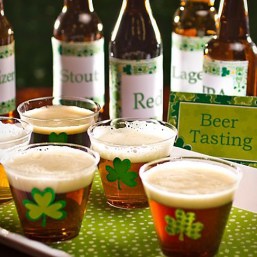
I had the privilege of being invited by legendary actress-turned-radio-host Marilu Henner for an interview on her radio show on St. Patrick’s Day, 2015. I prepared a lot of information about Irish beer, stouts, green beer and all the other things you might imagine would go along with beer and St. Patrick’s Day.
While I was waiting and prepping, Marilu walked in and we got to talking about beer and health, and eventually gluten-free beer. It turned out Marilu and her husband were in a very similar situation to me and my then-girlfriend. Her husband was sensitive to gluten and she adjusted her diet so they could both eat a lot of the same gluten-free foods. Same for me. Believe it or not, even as a long time beer enthusiast I am actually gluten sensitive and we ate dominantly gluten-free in our household so we could enjoy a lot of the same stuff (cue Samuel L. Jackson in Pulp Fiction talking about never getting to eat a hamburger because his wife was Vegetarian).
Consequently, the interview took a focus on beer and its health benefits and gluten-free beer. (So much for green beer… Next time!) If you are not familiar, Marilu Henner is very big on food and health and covers a lot of health info on her radio show. What was news to her and might be news to you as well is that most beer is nearly gluten-free. Actually, as far as the FDA rules are concerned, most of it actually is gluten-free.
Let me explain. The three primary glutinous grains are wheat, rye (which is actually a derivative of wheat) and barley, in that order. Barley doesn’t have that much gluten, but it still does have it. Beer is approximately 90% water, and the remaining 10% is mostly alcohol, hops, and residual sugar from the barley malt, so there’s not a ton of left over gluten to begin with. Gluten is a protein and proteins in liquid cause a cloudy haze. Since consumers generally prefer a pretty drink, beer makers filter their beer before packaging. They use products that bind to the proteins (including gluten) which the brewers then filter out, leaving the beer nice and sparkly.
So how much gluten is left in the beer? Well, that depends on the style, but the average filtered beer has as low as 3 to 5 up to maybe 10 or 12 Parts Per Million (or PPM) left after filtration. In context, the FDA classifies anything with 20 PPM or less as Gluten-Free. So if we wanted to argue on technicalities, we could classify most beer on the market as Gluten-Free. I’ll cheers to that!
Now let me be very clear, if you have Celiac disease then you should not drink any beer other than certified Gluten-Free beer. That beer is made with completely gluten-free ingredients and the good news is more GF beers are coming out all the time. But Celiac is a very different type of condition and those that have it on are a completely different plan than everyone else that is gluten sensitive. For those of us that are sensitive to gluten, we can still drink beer and we should be just fine.
There are a couple exceptions I want to point out. Belgian “Wits” and German “Hefeweizens” are both unfiltered wheat beers = stay away if you have gluten issues. They’re both well above the 20PPM threshold. Most all other Belgians = case by case basis. While most German and British* styles and their American equivalents are made with only barley, hops, water and yeast and filtered before packaging, Belgians tend to have a culinary approach to brewing. This means that a lot of Belgian beer may have wheat in it – even if only a little – as part of the total recipe. On top of that, most Belgian beers are unfiltered, so the overall PPM count is higher on average. If you are very sensitive, sadly I would stay away. If you are mildly sensitive, you could always email specific brewers and ask if they add wheat. They should get back to you with an answer. For the record I still drink Belgian beers. I don’t drink Wits and Hefs. *There is a wonderful resurgence of British “Cask Ale”, which is beer served straight out of the barrel it is fermented in. These beers won’t necessarily have wheat, but they will be unfiltered, so the PPM count will be a bit higher and might bother you. I’ve drank them without issues, but that’s me and I’m not drinking them every day.
I might fathom a guess that if you came my way looking for information about beer, you probably drink it and don’t have a gluten problem. But maybe you do, or maybe you know someone who does who has cut beer out of their life. They would probably love to hear this information.
I must do my due-diligence and state – I am not a doctor. You know your health and you need to tread carefully and see what affects you and what doesn’t. If you have a concern, don’t drink it, or talk to your doctor (from my experience, they probably won’t know that much unfortunately). I can tell you that my claims are based on lots of sound research**, since it is of great personal interest. Chances are, if you’re drinking a lot of beer and still feeling sick, it’s probably just the alcohol and not the 5 or 6 PPM of gluten in the bottle. **I have had several conversations with researchers and doctors from abroad who have shed some very interesting light on this current-evolving topic. This post is quite long, so I’m going to wrap for now, but further discussion is definitely on the agenda.
You can listen to my interview with Marilu Henner below.
To your health and good drinking.
Cheers!
Jeff
Margarete Diarmid Werra